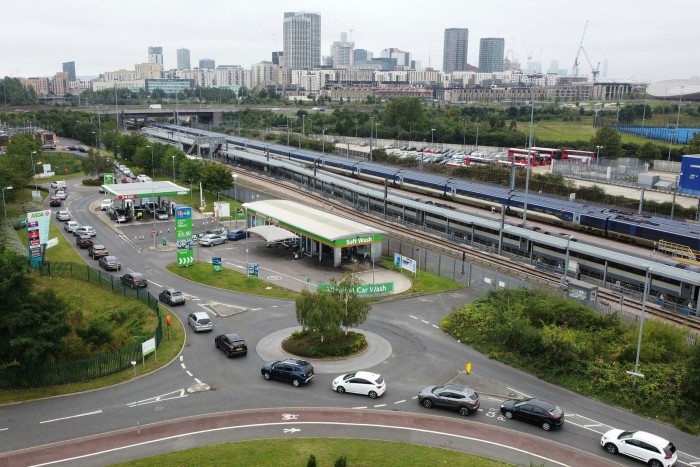The UK has put scores of troops on standby to help tackle the fuel crisis as ministers are set to meet to assess the latest data on the chaos at petrol stations across the country.
Brian Madderson, chair of the Petrol Retailers Association, a trade body, said the majority of service stations were without petrol and diesel on Monday, with members reporting between 50 and 90 per cent of independent sites had been drained dry by weekend panic buying.
Two Whitehall officials confirmed that the army was on a state of high alert as of Monday morning, with the military expected to help with fuel distribution, known in government as Operation Escalin, by providing trained heavy goods vehicle drivers.
One government insider said: “We have 150 troops on standby if ministers decide to give the go-ahead.” Another official said that a final number had not been confirmed but “troops are in readiness”.
But environment secretary George Eustice said on Monday there were “no plans” to draft in the army imminently. “We always have a civil contingencies section within the army on standby, but we’re not jumping to that necessarily at the moment,” he said.
Government ministers will meet later on Monday to examine the latest data from petrol stations and whether further action needs to be taken. The UK has some 8,000 petrol stations, the majority run by independent retailers, some of whom operate franchises using the big oil companies’ brands.
The shortages at fuel stations on Monday followed a weekend of panic buying sparked by reports of delivery problems, on a limited scale, caused by a Britain-wide dearth of HGV drivers, which has caused supply-chain problems across the economy.
On Sunday the government waived aspects of competition law to allow energy companies to co-operate to restock petrol stations.
There are fears within government and industry that with most forecourts in the country running dry there will be knock-on effects to the wider economy, with almost every sector and society reliant on regular fuel deliveries.
Industry bodies representing London’s black taxis have asked the mayor of London, Sadiq Khan, to push the central government to issue an emergency order to designate fuel stations only for “essential users”.
Downing Street did not rule out bringing in soldiers but insisted current “mitigations” would be enough to avoid such action.
A spokesman said: “We have ample fuel stocks in this country. The country can continue to be reassured there are no shortages. We’ll continue to work closely with the industry to take action where there is pressure on petrol stations.”
He added that “should the public return to their routine behaviour, that will significantly contribute to ending the challenges we’re seeing”.
But on Monday morning there was little sign of the situation improving. Many service stations that had been refilled overnight were selling out shortly after reopening, Madderson at the PRA said.
“We’re still seeing panic buying at a rate faster than deliveries can go in,” he added.
“There are huge strains in the supply chains but we’re hoping we might get to some sort of equilibrium by mid-to-late week if the panic subsides.”
Madderson said that while he was in close contact with the government, having met with business secretary Kwasi Kwarteng on Sunday, they were operating with “a bit of a black hole in terms of absolute accuracy” of data covering the number of service stations affected as the industry does not routinely submit daily fuel data to the government.
Madderson said that rural Wales and the highlands and islands of Scotland were generally well supplied with limited panic buying, according to his members. But cities and other more densely populated regions, particularly in England, were the hardest hit. Northern Ireland, where there has been less of a shortage of HGV drivers, was not facing any issues.
Royal Dutch Shell, one of the biggest suppliers to fuel stations in the UK, said it was trying to replenish forecourts as “quickly as we are able to”. Fuel suppliers have been prioritising motorway service stations but there have also been reports of shortages emerging on parts of the motorway network.
The RAC, an automotive services company, said the entire industry was facing “unbelievable pressure on the supply chain”.
“While there’s no shortage of fuel at refineries, panic buying over the weekend means every forecourt in the country needs to restock at the same time,” said Simon Williams at the RAC.
Shane Brennan, chief executive of the Cold Chain Federation, which represents the chilled distribution industry, said that despite the shortages at forecourts they had “no significant concerns about access to fuel either for trucks or for refrigeration units [which run on diesel]”.
“There are some concerns about whether the consumer behaviour might spread from fuel into other categories but there is no sign of that happening yet,” he said.
Additional reporting by Jonathan Eley
https://news.google.com/__i/rss/rd/articles/CBMiP2h0dHBzOi8vd3d3LmZ0LmNvbS9jb250ZW50LzNmNmZlZmUzLTNlMDItNDdhZi1iMmQ5LTBhMTI1NzAxZjgwMtIBP2h0dHBzOi8vYW1wLmZ0LmNvbS9jb250ZW50LzNmNmZlZmUzLTNlMDItNDdhZi1iMmQ5LTBhMTI1NzAxZjgwMg?oc=5
2021-09-27 13:07:41Z
52781901003874

Tidak ada komentar:
Posting Komentar